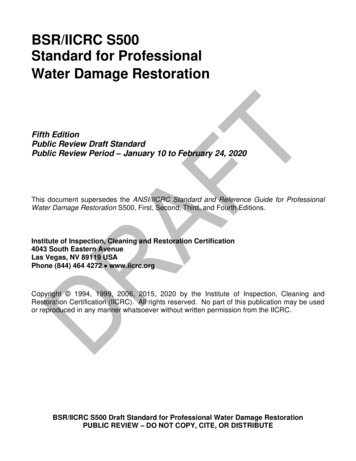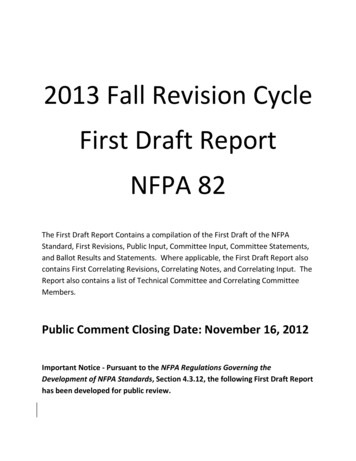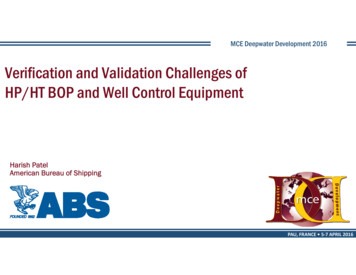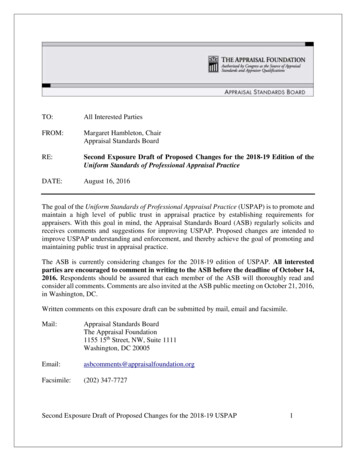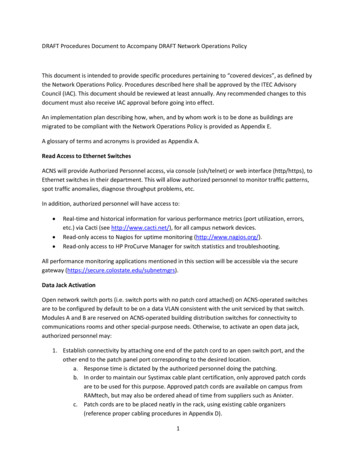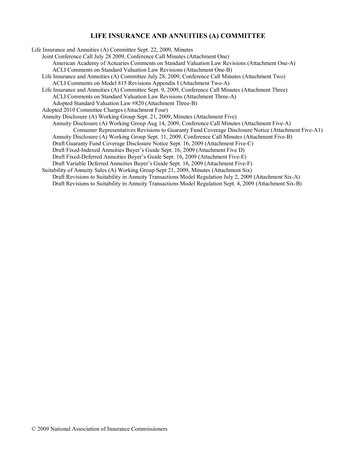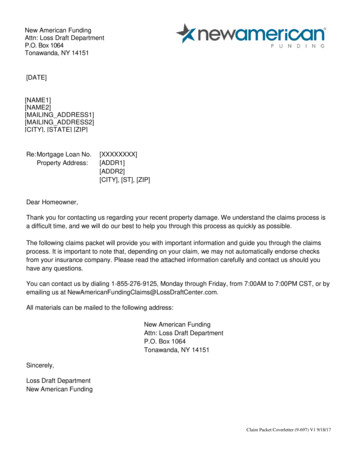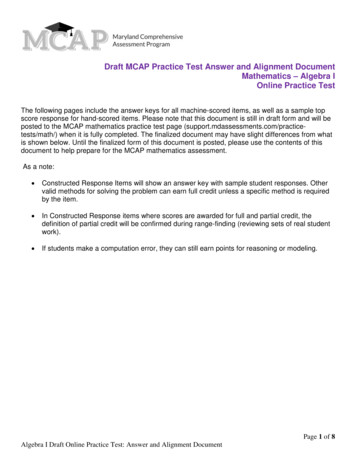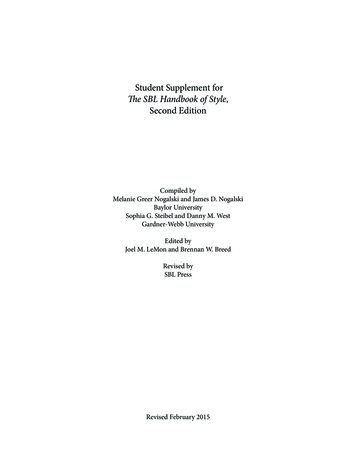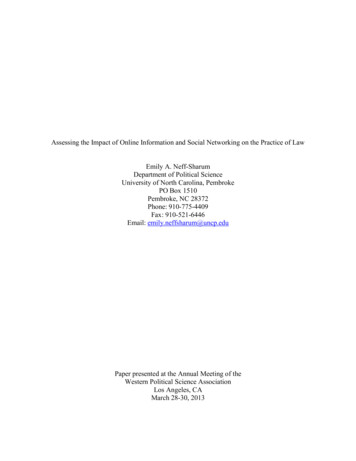
Transcription
Assessing the Impact of Online Information and Social Networking on the Practice of LawEmily A. Neff-SharumDepartment of Political ScienceUniversity of North Carolina, PembrokePO Box 1510Pembroke, NC 28372Phone: 910-775-4409Fax: 910-521-6446Email: emily.neffsharum@uncp.eduPaper presented at the Annual Meeting of theWestern Political Science AssociationLos Angeles, CAMarch 28-30, 2013
DRAFT: DO NOT CITE WITHOUT AUTHOR’S PERMISSIONAbstract: While there is a growing amount of research on the way the internet and socialnetworking effect multiple areas of government and politics, most research on the impact ofthese tools to the practice of law center on the internet as the subject of law or ethics questionsthe internet poses for relationships between attorneys and clients or attorneys and the broaderpublic. Little has been done to assess how professionally oriented online social networkingtools, like discussion boards and listservs, and general internet tools, such as Google andFacebook, are changing how attorneys build cases. Before assessing the kind of impact thesedevelopments will have on the content of the law, an assessment needs to be made of howwidespread the usage of such resources are. This paper presents preliminary results of a surveyof attorneys and their use of the internet and online social networking tools for how they practicethe law.
IntroductionThe rise of the internet and social networking in particular has significantly changed the wayAmericans work and communicate (Aral and Walker 2011; Houghton and Joinson 2010; Neff2005). The Pew Research Center found in one study that the use of social networking sites byadults had doubled between 2008 and 2011 (Raine, et. al. 2011). As the way Americanscommunicate and work changes, a reasonable expectation is that the way lawyers go about theirwork would also change.The field of political science has looked at the impact of the growth of internet usage andsocial networking in politics from a variety of standpoints. Researchers have considered thedevelopment of e-governance (Yang and Melitski 2007) and its impact on citizens (Dawes2008), the evolution of the White House’s use of the web and social media (Owens and Davis2008), the impact of the internet on patterns of political participation (Best and Krueger 2005;Scholzman et. al. 2010), and the impact of the internet and social networking on campaigns(Gurevitch et. al. 2009; Herrnson, et. al. 2007; Tolbert and McNeal 2003). The generalconsensus across all these studies has been that while in many ways tried and true theories ofunderstanding politics remain true today, the internet has brought significant changes toeverything from local governance to political participation and electoral campaigns.This paper presents some preliminary findings from the first round of a survey of attorneysregarding their usage of the internet and professional, online social networking opportunities intheir practice of the law and phone interviews with a subset of respondents. The survey asksattorneys about the types of resources that they use when working on cases, completingtransactions, and resolving issues for clients. Excluded from the interview are questions aboutadvertising and soliciting clients. This is an ongoing survey, which currently has a second
request for participants to complete surveys deployed.Previous Consideration of the Internet, Social Networking, and Attorneys’ WorkWithin the arena of the practice of the law, there have been several areas of researchregarding how the internet has influenced the work of attorneys. A core area of this research hasbeen to understand the internet as a new area of the law (Reidenberg 2005; Search 1999;Weinberg 2000; Wu 1999). This consideration of the internet and the law seeks to develop anunderstanding of issues like copyright and ownership within the digital world.Another area of research is the impact of increased internet usage on attorney-clientrelationships for both advertising and providing legal advice to clients. In an early commentaryon the ethics of attorneys’ use of technology to give legal advice online, Lanctot (1999) findsthat there are many sources where attorneys interact online with clients or potential clients suchas legal newsgroups, listservs, chat rooms, advice columns, emailed requests for information oradvice, fee based internet legal advice, and other variations that are found online. In an essay onhow the internet is changing the practice of law, Bierman and Hitt (2007) acknowledge theincreasing pressure from clients for attorneys to be accessible 24/7 by email and cell phone.More recently, the discussion of the ethical questions surrounding the internet, attorneys,and the public have centered around Facebook and other social networking media. Someattorneys have started to use Facebook and similar sites for a wide variety of purposes, including:advertising, vetting public sympathy on case situations and arguments, providing generalizedadvice, and blogging about personal views on the law (Williams 2009; Lackey and Minta 2012).Generally, articles discussing the ethical questions surrounding attorney use of social networkinghas been warn practitioners 1) to remember that the ethical rules regarding advertising andconfidentiality apply to these forums, 2) to guard against any comments that may call into
question the neutrality of the attorney, and 3) to guard against any comments or publicfriendships that may be construed as improper (i.e., online relationships between attorneys andjudges). These ethical questions about the use of the internet in exchanges between attorneys andthe broader world continue to be a question with which the legal profession grapples.Despite efforts to consider the way the internet has changed the way attorneys work, littlework has been done to begin to assess the impact of the digital age, in particular online socialnetworking, on attorney to attorney communication in the course of their work to practice thelaw. Heinz, et.al. (2001) in their assessment of transformations of urban law practices havenoted that technological innovations have had an impact on the configuration of practices, buttheir assessment is limited to the accessibility of fax machines and computers. They do note thatin 2001, access to legal research sources such as Westlaw and Lexis Nexis were cost prohibitivefor many small firms and solos practices.But, the cutting-edge technology of a few years ago becomes “old hat” relatively quickly.As Heinz, et. al. (2001) note, as the cost of technology that at one point makes it prohibitivechanges in price, it comes into normal use—including within the legal profession. But inaddition to costs coming down, groups can make technology more affordable. Professionalgroups such as bar associations and specialized legal groups such as various trial lawyersassociations have begun to offer many internet based resources as a membership benefit. Thishas meant that resources that were only available to large practices are more readily availableand are no longer cost prohibitive. Today a primary benefit that professional organizations forattorneys offer is a set of online tools to aid in legal work. Some organizations provide access tostate level case research sites similar to what Lexis Nexis or Westlaw provide at a national level.For instance, the New Jersey Bar Association provides access to NJ Fastcase for its members,
and the Arkansas Bar Association provides access to AR Fastcase for its members.Another popular tool provided by legal professional organizations is access to listservs anddiscussion boards that allow attorneys to pose and answer questions to one another. Wasko andFaraj (2005) study contributions to online discussion threads by an un-named legal professionalorganization to better understand what motivates people to contribute ideas and answers todiscussion threads generally. They find that the rate of helpful contributions is a function ofindividual motivations—such as wanting to be helpful and enhancing professional reputations—and structural factors—such as having social ties with other contributors. What is left to beunderstood is the extent to which attorneys are starting to incorporate information from listservsand other online professional social networking resources into how they do their work. Whilefew attorneys may contribute (Wasko and Faraj 2005), many more are free-riders of theinformation provided by listservs and discussion boards. In addition to not providing a goodassessment of how extensive attorney reliance on professional online social networking isgenerally, the literature does not seem to provide a good assessment of the extent to whichattorneys depend on such sources for putting together major cases.This paper presents the results of a survey of attorneys in Arkansas, New Jersey, NorthCarolina, Texas, and Washington as a first step toward a broader project seeking to understandthe ways in which online professional social networking and other methods for facilitating thedigital flow of information are impacting the practice of law. If some attorneys are increasinglyrelying on online professional social networking and listservs for peer advice in practice, thismay be a factor that could influence the effectiveness of an attorney’s practice. There is evidencethat ideas can take on a life of their own in digital spaces. For instance, Onnela, Reed-Tsochas,and Stanley (2010) argue that in social networking with endogenous features (the user is in
control of who they interact with or “friend”), like Facebook, behaviors such as using anapplication can be the result of spontaneous occurrences of social influence. The authors findthat the impact of the social network to adopt a behavior is either “on”—meaning that socialinfluence is deterministic of people engaging in a behavior (installing applications), but below acritical threshold it is “off”—social influence does not have an impact on behavioral choice(installing an application). This is useful for thinking about attorneys and social networkingbecause if the information environment attorneys are using becomes more endogenous (i.e.,using professional listservs to solicit advice on a case), some kinds of strategies or argumentsmay have this self-perpetuating popularity rather than being externally shown to be goodstrategies (i.e., people consistently win with them). This study provides a beginning tounderstand who uses online resources and online social networking opportunities and how suchresources are used by attorneys today.MethodSurveys were sent to 1150 attorneys across Arkansas, New Jersey, North Carolina, Texas,and Washington. Surveys were sent to a stratified random sample of attorneys in privatepractice. Attorneys were randomly selected from the Yellow Book, an online yellow pagesservice, from selected communities in each state. These communities included the state capital,the two largest cities in the state, and a subset of rural communities selected randomly. Thesurvey tool was developed to assess the key variables of interest (internet and social networkingusage in legal practice) as well as other control variables (gender, type of law practiced, etc.) andfuture dependent variables of interest (self-reported measures of success in legal practice).
Out of the original 1150 surveys mailed, 150 responses were returned. Of these surveys only45 were valid surveys. The 105 invalid surveys included attorneys declining to participate or keysections of interest left blank or incomplete. While efforts to increase the participation rate areunderway, this paper presents some preliminary results of surveys and interviews. Respondentswere also asked if they would like to participate in long phone interviews to follow up on surveyresults. Ten of the 45 respondents were interviewed about their use of online resources andsocial networking.Preliminary findingsHigh use and low use attorneysThere is a lot of variation in the usage of internet resources and professional socialnetworking by attorneys. Using responses to a series of questions about 1) the use of onlineresources generally, 2) the types of technology used in daily work, 3) the usage of onlineresources provided by professional associations, and 4) how often attorneys use online resources,an index of technology usage was created. Ranges of the index were collapsed into high internetusage in the practice of law, moderate usage, and low usage. Even with the limited response rate,some patterns in usage were found.Herrnson, et. al. (2007) have found that younger citizens are more likely to accessinformation, including political information, online and to be influenced by social media such asFacebook. This pattern of influence could easily hold true for young attorneys practicing thelaw. Younger attorneys are more likely to have grown up using new technologies but also wentto law school during a period of major technological and communications innovations. As aresult of being part of the generation that has ushered in the social media revolution in personal
communication, I considered whether these attorneys will be more likely to use thesetechnologies professionally. Older attorneys, who may be at the end of their careers, have lessreason to change their method of working since the investment in learning to use new tools andto effectively navigate new information environments may be costly in terms of time.Table 1 is a cross-tabulation of internet usage and age. The expected pattern is affirmedwith young attorneys having the smallest percentage of attorneys who have low usage of theinternet (10% of those 33-45 and 26% of those 46-59), while older attorneys have the largestpercentages of low internet usage in practicing law (43% of 60-67 year olds and 100% of thoseover 68).Table 1. Internet Usage in Legal Practice by Age33-4510%46-5926%60-6743%68 and LowTotal5850100%100%100%100%1019142Young attorneys have the largest percentage of high internet usage, with 40% ofrespondents aged 33-45. The number of attorneys who score as high internet usage steadilydeclines with 32% of those aged 46-59, 21% of those 60-67, and 0% of those over 68 scoringthis rating.Attorney responses to surveys and subsequent interviews identified several key ways inwhich the internet and professional online social networking has become a key part to how theygo about the business of practicing law. A common tool that attorneys discussed is the move oflegal research from libraries and books to online resources such as Westlaw, Lexis-Nexis,
Fastcase, and Cornell Law Legal Information database of Supreme Court decisions. WhileHeinz, et.al. (2001) note that at one time the move to online legal research was considered to becost prohibitive for many attorneys, the advent of the information age has been a great equalizerfor law firms’ access to online information.Second, many attorneys noted that an increasingly integral part of making decisions abouthow to proceed in a case or how best to help a client has been the rise of the legal listserv.Everyday social networking has moved from bulletin boards and listservs to chat rooms to socialnetworking websites like Facebook and Twitter. In the legal community, social networking hasflourished though the old technology of email listservs. Attorneys are able to become membersof various, topic-specific email based listservs through professional associations. As members ofthese listservs, attorneys are able to 1) solicit advice or pose questions, 2) respond to questionseither publicly to the listserv or privately to individual attorneys posing the question, 3) postinformation believed to be of interest to the listserv community, and/or 4) passively consume theinformation from the conversation posted to the listserv.Listservs can be a place where general mentoring about both cases and the profession cantake place. One woman from Washington in her fifties explained that mentoring on listservs hasbeen helpful for her throughout her career. She explained that she would both give and receiveinformation about how best to deal with all areas of her practice. Advice that she found helpfulranged from case briefing samples to explanations of how case law updates would impact futurecases. As result of these well-developed mentoring relationships, this attorney was one of themany attorneys I found that participated on listservs every day.Not all attorneys found the listservs and similar resources provided by professionalassociations to be useful. For instance, one attorney wrote on his survey, “Social networking is
just bullshit! (Please excuse the language, but it is an accurate reflection of my views). I am notrepresentative of the legal profession.” Others are critical of the usage of public forums todiscuss cases, citing issues with confidentiality and ethics. One male attorney, age 33-45 argued,“Discussing cases on an open, insecure forum such as Twitter, Facebook, or similar socialnetworking forums is unethical and a violation of the rules of professional conduct. Listservs arebetter but they are still problematic. Other attorneys can see what you are posting and will usewhat you're concerned about against you.” While these positions were uncommon in this study,clearly the move to utilizing open communication has its detractors.General legal researchAll attorneys engage in legal research as part of practicing the law. While once legalresearch meant having access to a legal library with print copies of journals and books, todaymuch of legal research has moved to digital formats online. One of the most common tools forlegal research is subscription services for legal databases such as Lexis-Nexis or Westlaw.Individuals using these services must pay for them. While use of subscription services wereextensive, they were not universal. Sixty-two percent of attorneys reported using subscriptionbased legal services. A few attorneys reported using other kinds of subscription based servicesfor case specific research such as Accurinit which is a fee-based service that helps attorneys toconduct skip traces to track down individuals. While not exactly a fee based subscription,attorneys who maintain their professional association memberships are given access to online,general legal research resources. For instance in every state surveyed, attorneys noted that statebar associations provided access to state based subscriptions to Fastcase, which is a broad-basedlegal research resource.
As one attorney noted, “I have found that I can find just as much relevant legal material byusing free internet search browsers as paid ones.” Many attorneys, both those who reportedusing subscription based services and those who did not, reported using general internet searchengines to conduct legal research and find case materials. A couple of attorneys noted thatinstead of using pay services, they utilize free resources such as the Cornell Law LegalInformation website. In particular, Google was extensively referenced as an important source oflegal research. For instance, an attorney who has practiced in the area of tax controversy for nineyears highlighted how Google has been a key source for legal research for his practice. In hisinterview, he reported, “Google is a wonderful research tool if you know what to look for. Isearch Google daily for news related to some of the sub-practice in tax controversy.” He arguedthat the price of many subscription based services were not worth the cost if an attorney hadsolid skills at searching the internet. There were diverse sets of information that attorneysreported finding with general internet research. This included finding jury verdicts andsettlement ranges or values in similar cases, finding resources for clients, finding maps andgeographic information relating to the case, topics, assessing policy changes that affect a case,and more.In addition to general internet search engines and subscription based services, attorneysreport that state government and court websites are useful tools in the practice of law. Forinstance, one gentleman in his sixties found, “Court websites are useful. The availability ofstatues and ordinances online can be used to refer clients.” What he found is that oftentimesclients wanted more information about what was happening in their case and the court websiteswere a useful tool. Thirty-one percent of respondents reported using court websites regularly intheir work. These attorneys specified that court websites provide extensive resources ranging
from opinions to calendars to forms and other information. While not specifically asked in asurvey question, in the open response section of the survey, many attorneys reported using othere-government features for developing case material or getting information critical for theirpractice. This includes online filings found with secretaries of state, Uniform Commercial Codesearches, searches for federal or state tax liens, county recorders’ websites to determine owner ofproperty, state police WATCH websites, and websites for local jails.Case adviceThe survey asked respondents questions regarding their use of professional, online socialnetworking opportunities including listservs. In the initial survey responses, 31 respondents(68.9%) report that they use professional association discussion boards or listservs to get findadvice about cases. Additionally, twenty respondents (44.4%) reported using discussion boardsor listservs to try to find arguments that were tried successfully in a similar case. Duringinterviews, many attorneys underscored that listservs were an important part of developing casematerials. For instance, a criminal defense attorney from New Jersey, in practice for fourteenyears, stated, “Listservs give me insight into issues and perception. For instance, discussionabout similar cases can help me figure out if I am missing something.” This sentiment wasechoed by others. For instance, one male attorney in his sixties from North Carolina wasdiscussing how listservs have helped him in his work on estate planning, probate, and estateadministration. He found that listservs were most useful for “developing strategies and ideas.”Several individuals articulated that they regularly turn to listservs as a place to get help to findcases with similar issues or to find “cases which supported the issues in the case.”While many attorney’s used online forums such as email based listservs to solicit caseadvice, not all attorneys did so. While many factors may account for this, two different theories
may relate to social interactions. A reasonable expectation is that those who are more social indiscussing their practice at informal gatherings of attorneys and judges would be more likely tosolicit case advice in online forums such as listservs. These individuals may be more social inhow they work, consistently seeking feedback from multiple sources. Second, a reasonableexpectation would be those who do not attend informal social gatherings of attorneys and judgesmay be more likely to utilize online forums for case advice since their social circle may notprovide opportunities for soliciting advice at social gatherings. Figure 1 provides a comparisonof how often attorneys meet informally and discuss cases and attorneys who solicit case adviceonline. We find that the relationship functions as expected with those who do not meetinformally having the highest levels of case advice online, and with those who often discusscases informally having the second highest number of attorneys seeking case advice online.Asthe number of cases in the survey increases with additional respondents after the second requestfor participation, this relationship will be further assessed for significance and level ofassociation.Figure 1 Comparison of attorneys who meet with otherattorneys and judges informally and those who solicit caseadvice online14121086420Does not meetinformallyNeverGets Case Advice OnlineOccassionallySometimesOftenDoes Not Get Case Advice Online
Case advice can be more than help with legal research. Developing case strategies may be aproduct of having a good understanding of the proclivities of the judge hearing the case or theopposing counsel. Additionally, attorneys may be looking for expert witnesses who candependably perform on the witness stand regarding general assessments of a situation. Manyrespondents used listservs to gather such additional information to aid in developing their casesand completing transactions, including information about the idiosyncrasies of judges, otherattorneys, and expert witnesses. Eighteen respondents reported using listservs and discussionboards to solicit references for expert witnesses. Additionally, just over one-fourth ofrespondents (12 respondents) solicited advice about dealing with a particular judge, and twelverespondents solicited advice about dealing with opposing counsel. In addition to using listservs,many attorneys reported that the internet generally has provided a wealth of information aboutjudges, adversaries, and experts. For instance, an attorney from Texas discussed his use of otherlaw firm’s websites. He regularly would look at the law firm’s websites to study the biographiesposted for opposing counsel and read newsletters from other firms to gain clues to what opposingcounsel strategy may be like.While no attorney discussed using Facebook to get case advice on the survey, duringinterviews one attorney discussed a unique use of Facebook to get case advice from everydaypeople on her “friends list.” She discussed how oftentimes an attorney’s view of a case andunderstanding of the facts is very different from the common citizen who may be serving on ajury. She reported that she would regularly ask generalized questions to her Facebook friendsregarding how a regular person would view a situation. For instance, in one post she posed thequestion of whether a person should be ticketed for public intoxication if they were choosing towalk home rather than drive home drunk. This was an argument she was considering using in a
case where her client was fighting a ticket for public intoxication. She said that the feedback wasreally helpful, and as a result she continues to pose generalized questions with no informationthat may identify her client. While the usage of social networking for this attorney may be anovel case, it demonstrates the ways in which social networking and online resources areevolving the way in which attorneys develop and test arguments before using them in court or inother legal transactions.Gaining the informational upper handIn addition to strictly using the internet for legal research, many attorneys noted that theinternet, Facebook in particular, is a useful tool in gaining information about witnesses, opposingparties, and their own clients that may have bearing on a case. This information was providedthrough open comments and interviews. Several attorneys discussed their ability to findinformation about locations of individuals, witnesses, and the opponent using online searchengines such as Google as well as social networking forums such as Facebook, dating websiteslike Match.com, and outreach forums such as Classmates.com. For instance in discussing his useof Google and Facebook, one attorney wrote, “If you put it online, it could and likely will befound.” A second attorney explained her use of Facebook and Match.com in researchingopposing parties, “It's [the internet] great for research on adversaries and creating apsychological profile.” She found that she was able to better understand the motivations forvarious parties in the case (both her client and the opponent) by reading their profiles on bothFacebook and on online dating services they may subscribe to. In one interview, an attorneyfrom North Carolina explained that she used Facebook postings in multiple ways. First, shewould often find postings by an opposing party that could be used against them in court. She
also found that Facebook was very useful in tracking her own clients, making sure they werefollowing her advice about activity during proceedings (i.e., being quiet about divorceproceedings, following a restraining order, etc.). Finally, she used Facebook to find people thatmay have a bearing on the case by using “friends lists” for clients and opponents. Suchtechniques were confirmed by others such as a younger male attorney from New Jersey whoargued that Facebook was a great way to get information about opposing parties includingbackground information and cross-examination material.In this survey, the most common area of law practiced by those who used Facebook wasfamily law (divorce, custody, etc.) and criminal law. Some attorneys noted that they do not justuse Facebook to find information potentially pertinent to cases, but also that they warn theirclients of such a potential. One family law attorney from Texas explained, “I tell my clients notto mention anything about their divorce or ex or soon-to-be ex-spouse on Facebook, etc. Someactually listen!” In an era in which many people place details about their personal life online,many attorneys have double duty in representing their clients. They must also be concerned withthe public presence of private information.ConclusionThis paper presented some preliminary findings of a survey on the use of online socialnetworking by attorneys. This initial look at the first round or respondents provides someinsights to how the practice of law is increasingly dependent on online resources and socialnetworking. The general trend is that while some attorneys are skeptical of the ways in whichthe internet and online social networking can be useful, the majority of respondents have foundthat the internet has had a significant impact on how th
University of North Carolina, Pembroke . PO Box 1510 . Pembroke, NC 28372 . Phone: 910-775-4409 . Fax: 910-521-6446 . Email: emily.neffsharum@uncp.edu . Paper presented at the Annual Meeting of the . Western Political Science Association . Los Angeles, CA . March 28-30, 2013 . DRAFT: DO NOT CITE WITHOUT AUTHOR'S PERMISSION .
